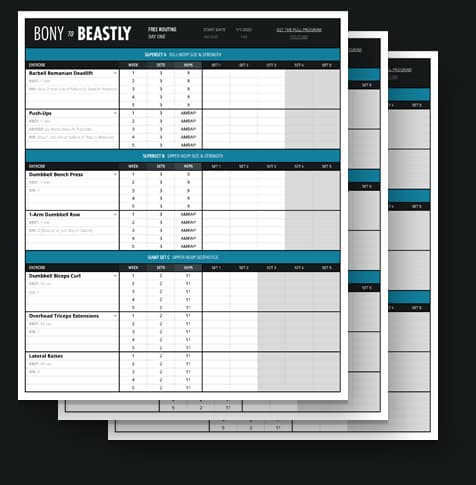FFMI Calculator
Fat-Free Mass Index
What's FFMI?
Fat-Free Mass Index (FFMI) is used to gauge how muscular someone is at a given height. It's like BMI but for bodybuilders.
Your FFMI takes into account all of your lean mass. It factors in your muscle mass, organs, skin, water, blood, and the lean mass that holds your fat together. That means that having thicker bones, broader shoulders, wider hips, and more body fat increases your FFMI.
The formula was originally designed for men who were 5'11 (180 cm), so this calculator uses a normalized FFMI that works for any height. This is standard practice. The results align with what you'd find in the research.
What'S a Good FFMI?
An FFMI of above 20 is an above-average amount of muscle mass. If you can do that while also being lean, that means you have great body composition. If you can get up to a lean FFMI of 21–23, you'll probably have an impressively athletic physique.
- Less than 18: Below average muscle mass
- 18–20: Average muscle mass
- 20–22: Above average muscle mass
- 22–25: Highly muscular
- More than 25: Suspiciously muscular
I started getting compliments for being muscular when my FFMI crossed 20 (while being lean). My wife considered me pleasantly muscular at that point. The highest I've ever gotten is an FFMI of 22. That's been more than enough to succeed in the fitness industry.
Note that fat contains some lean mass, so the fatter you are, the higher your FFMI will be. The man with the highest FFMI ever recorded was a sumo wrestler.
get the google spreadsheet of the
free beginner’s full-body workout

Get the workout as a Google spreadsheet. You’ll be able to pick from exercise alternatives, fill out the sheet, and get our beginner’s warm-up.
Plus, we’ll make sure you’re on the b2B newsletter, and send you all of our best muscle-building content.
What FFMI Can You Get Naturally?
Most natural athletes can get an FFMI of 21–23. It's possible that if you try to build as much muscle as possible, you'll be able to get a fair bit more muscular, especially if you have unusually good genetics. It's hard to say.
FFMI isn't very good at predicting how big you can get naturally. Think of a bookshelf. FFMI takes into account how tall the bookshelf is, but it doesn't consider how wide it is, so it's hard to tell how many books will fit.
Also, FFMI isn't just weighing the books (muscle mass), it's also weighing the bookshelf itself (bones, organs, skin, water, blood, and the lean mass in your fat). So, if your bookshelf is wider and made of thicker slabs of wood, your FFMI will be higher, and it will be able to hold more books.
If you want to estimate your natural muscular potential, use this calculator. It factors in how thick your bones are by using your wrist and ankle circumferences.
Does a 25+ FFMI Prove Steroids?
There's a misconception that an FFMI of 25 marks the threshold between natural lifters and guys who take steroids. It comes from an old study by Kouri and colleagues (study). The researchers looked at 157 male athletes, finding that all of the natural athletes had an FFMI under 25, whereas some of the steroid users were above that.
In truth:
- Most natural lifters never get close to an FFMI of 25. That's an incredible degree of muscularity. It would make you one of the best natural bodybuilders in history. In the study referenced above, the average athlete had an FFMI of 21.8.
- Most guys who take steroids don't have FFMIs over 25. In the study above, even among athletes, only around half of the steroid users had FFMIs over 25.
- Some natural lifters have an FFMI greater than 25. Genetics vary tremendously between people. The best bodybuilders from the pre-steroid had FFMIs of about 25. The highest was 27 or 28.
The shortest man is under 2 feet tall, and the tallest man is nearly 9 feet tall. That isn't because of performance-enhancing drugs, just genetics and circumstance. The same is true with muscularity.
You may not ever see a natural lifter with an exceptional degree of muscularity in real life, but you might see one in the NFL, at a powerlifting competition, or on a bodybuilding stage. You might also see one with a million followers on social media.
So, if someone has an FFMI of over 25, it's pretty likely that they have great genetics and take steroids, but it's plausible for it to be remarkable amounts of one or the other. If they're in an industry that draws people with exceptional genetics (like sports or the fitness industry), then a genetic advantage is more likely to be a factor, but there's also a greater incentive to take steroids and lie about it.
The Bony to Beastly Program
If you want a full fat loss and muscle-building program, including a 5-month workout routine, a diet guide, a recipe book, and online coaching, check out our Bony to Beastly Bulking Program. Or, if you want a customizable intermediate hypertrophy program, check out our Outlift Program. You can use either of these programs for bulking, cutting, or recomping.
Alright, that’s it for now. If you made it this deep into the article, you might like our newsletter.

